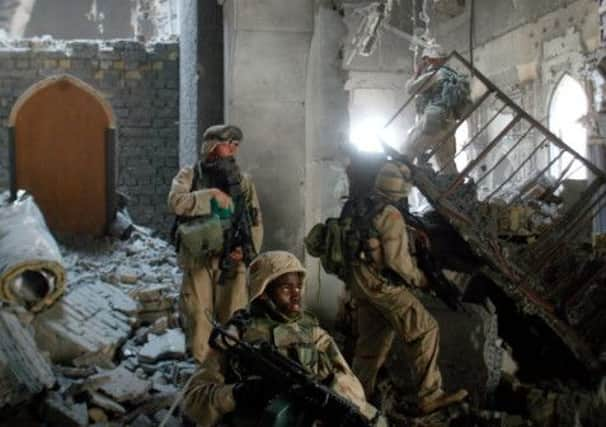Richard Hopwood: Iraq’s legacy: false causes, failed tactics and a war that could not happen again


Sir John Chilcot’s inquiry into Britain’s role in the conflict is finally due to report later this year, a full decade after the war itself.
Four previous inquiries, however, have yet to provide the proof of what is so widely believed, that Tony Blair deliberately distorted military intelligence to portray a growing threat from Saddam Hussein’s weapons of mass destruction because he did not believe that the need to topple Saddam was sufficient justification for war.
Advertisement
Hide AdAdvertisement
Hide AdBut does anyone really need such interminable investigation to tell them what is patently clear, that the British government stretched flimsy evidence to its furthest extent to try to win the United Nations backing that Blair so desperately wanted?
Spin, exaggeration and the careful massaging of facts, after all, were the administration’s stock-in-trade. Director of communications Alastair Campbell turned media manipulation into an art form and many were the honeyed promises that dropped from the lips of Tony Blair only to go unfulfilled and forgotten, as Gordon Brown or David Trimble might confirm.
When Blair was convinced he was right (the fight for the Labour leadership, the need to sign the Good Friday Agreement), he would go to extraordinary lengths to ensure that he got his way. And, as he has made clear repeatedly over the past 10 years, he was sure he was right over Iraq.
For his part, George W Bush could never understand Blair’s craving for UN approval. In Washington, regime change was always sufficient reason for war.
Advertisement
Hide AdAdvertisement
Hide AdAfter all, here was a dictator who had already attacked three of his own neighbours, who had mounted campaigns of extermination against Kurds and Shias and who brutally persecuted his own people on a daily basis.
In any case, why should military action have been determined by a Security Council whose members included France and Russia, countries with vested interests in the form of oil deals with Saddam, and China, a regime with as much blood on its hands as Saddam himself?
It should also be remembered that, at the time, every major intelligence agency on the planet, including those of countries opposed to the war, believed that Iraq possessed WMD. And, although there was no evidence of any connection between Saddam and al-Qaida, in the wake of 9/11 it was not unreasonable to conclude that a murderous dictator, with a track record of developing chemical, biological and nuclear weapons, was simply too dangerous to be left in power, defying UN resolutions and flouting sanctions with impunity.
Indeed, it is often forgotten that David Kelly – the weapons expert found dead after being revealed as the source of a BBC story claiming that Downing Street distorted intelligence on Iraq – had said that he believed Saddam to be a threat, that the dictator would never stop trying to develop WMD for both military and terrorist use and that war was the only way to disarm him conclusively.
Advertisement
Hide AdAdvertisement
Hide AdHowever, if there was a clear rationale to the war, the real tragedy of the invasion – after a brilliantly executed military campaign – was its aftermath and the abdication of responsibility first by the Americans and then by the British.
Of course, it is easy to spot mistakes with hindsight and, at the time, few spoke up when Saddam’s Ba’ath Party officials were removed from office and Iraq’s security forces were dissolved. Yet both these decisions are now seen as key factors in the breakdown of law and order that followed the invasion and allowed the subsequent insurgency to gather force. But mistakes are one thing. The lack of preparation for the occupation of Iraq, the unwillingness to commit sufficient troops and the general US ambivalence towards moving Iraq from brutal dictatorship to functioning democracy was irresponsibility of an entirely different order. And it led directly to the chaos that followed, the years of sectarian violence and the loss of thousands of lives.
Just in time, Washington recognised its foolhardiness and corrected matters with the so-called surge, a huge increase in men and resources, which finally brought some stability to Iraq and allowed the US to plan its exit.
Yet, while America learned from its errors, Britain embarked on a disastrous policy of negotiation with the Iranian-backed militia in Basra, leading to a shambolic security situation in which Muqtada al-Sadr’s Mahdi Army ran rampant through the city.
Advertisement
Hide AdAdvertisement
Hide AdInstead of confronting them, however, the British placated them, eventually signing a deal agreeing not to enter Basra in return for a promise by Sadr to stop attacking them.
As a result, Britain was shamefully confined to barracks while American and Iraqi forces did their job for them, driving the Mahdi Army out of town.
Lacking troops and equipment and without political commitment from Gordon Brown’s government, British forces had a humiliating exit from Iraq. Indeed, thanks to Blair’s reluctance to admit he was planning a war and Brown’s reluctance to commit resources, they had been under-prepared and under-resourced throughout the occupation.
Ironically, then, a war which began by demonstrating the strength of the relationship between Britain and America ended with Britain’s military reputation in Washington lower than it had been for decades.
Advertisement
Hide AdAdvertisement
Hide AdAnd while Iraq may be a better place without Saddam, the wider legacy of the war is that other dictators, whether in Iran, Syria or North Korea, can breathe a little easier.
In Britain, America and across Europe, the political cost of the Iraq war, combined with the defence cuts that followed the global financial crisis, means that no western government has either the will or the means to take on such a venture again.
For better or worse, the age of interventionist wars is over.